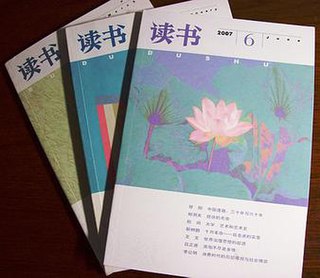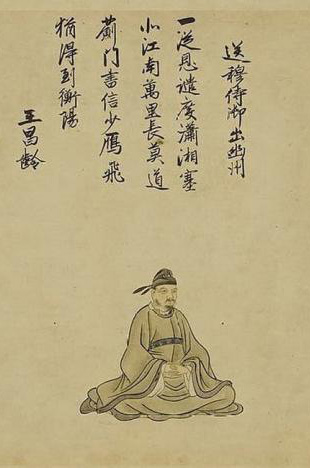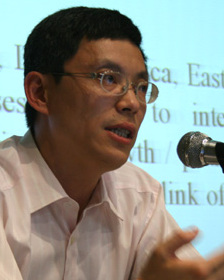
Wang Zhaoming, widely known by his pen name Wang Jingwei, was a Chinese politician who was president of the Reorganized National Government of the Republic of China, a puppet state of Japan. He was initially a member of the left wing of the Kuomintang, leading a government in Wuhan in opposition to the right-wing government in Nanjing, but later became increasingly anti-communist after his efforts to collaborate with the Chinese Communist Party ended in political failure.

Wang Chien-shien is a Taiwanese politician who is the founder of the New Party. He was finance minister of the Republic of China from 1990 to 1992 and is the chairman of the Chinese Management Association (CMA). Wang was the President of the Control Yuan from August 2008 to August 2014.

Fredric Jameson is an American literary critic, philosopher and Marxist political theorist. He is best known for his analysis of contemporary cultural trends, particularly his analysis of postmodernity and capitalism. Jameson's best-known books include Postmodernism, or, The Cultural Logic of Late Capitalism (1991) and The Political Unconscious (1981).
The Chinese New Left is a term used in the People's Republic of China to describe a diverse range of left-wing political philosophies that emerged in the 1990s that are critical of the economic reforms instituted under Deng Xiaoping, which emphasized policies of market liberalization and privatization to promote economic growth and modernization.

Unrestricted Warfare: Two Air Force Senior Colonels on Scenarios for War and the Operational Art in an Era of Globalization is a book on military strategy written in 1999 by two colonels in the People's Liberation Army (PLA), Qiao Liang (乔良) and Wang Xiangsui (王湘穗). Its primary concern is how a nation such as China can defeat a technologically superior opponent through a variety of means. Rather than focusing on direct military confrontation, this book instead examines a variety of other means such as political warfare. Such means include using legal tools and economic means as leverage over one's opponent and circumvent the need for direct military action.

Jixiangornis is a genus of basal avialan dinosaurs from the Early Cretaceous. Like later avialans, it had no teeth, but it also had a long tail, unlike modern birds. Since teeth were still present in some more derived short-tailed avialans, Jixiangornis seems to have evolved its toothlessness independently of modern birds. The long forelimb indicates at least some aerial ability. Jixiangornis is currently known only from a single specimen, a complete but juvenile skeleton. The fossil was found in the Yixian Formation near Beipiao City, western Liaoning, China.
Liberalism in China is a development from classical liberalism as it was introduced into China during the Republican period and, later, reintroduced after the end of the Cultural Revolution.

Dushu is a monthly Chinese literary magazine which has great influence on Chinese intellectuals. It is based in Beijing.

Wang Changling was a major Tang dynasty poet. His courtesy name was Shaobo (少伯). He was originally from Taiyuan in present-day Shanxi province, according to the editors of the Three Hundred Tang Poems, although other sources claim that he was actually from Jiangning near modern-day Nanjing. After passing the prestigious jinshi examination, he became a secretarial official and later held other imperial positions, including that of an official posting to Sishui (汜水), in what is currently Xingyang, in Henan province. Near the end of his life he was appointed as a minister of Jiangning county. He died in the An Lushan Rebellion; between the 10th month of the 14th year of the Tianbao era and the second year of the Zhide era, he was executed by the Tang official Lü Qiuxiao (閭丘曉). When Lü later was sentenced to death by another official Zhang Hao (張鎬), he pleaded for mercy, citing the fact that he had kin to take care of. Zhang's retort was, "Then, who's left to take care of Wang Changling's kin?". Lü went silent after that.
Li is a concept found in neo-Confucian Chinese philosophy. It refers to the underlying reason and order of nature as reflected in its organic forms.

Zhongyuan (Chinese: 中原; pinyin: Zhōngyuán), the Central Plain(s), also known as Zhongtu (Chinese: 中土; pinyin: Zhōngtǔ, lit. 'central land') and Zhongzhou (Chinese: 中州; pinyin: Zhōngzhōu, lit. 'central region'), commonly refers to the part of the North China Plain surrounding the lower and middle reaches of the Yellow River, centered on the region between Luoyang and Kaifeng. It has been perceived as the birthplace of the Chinese civilization. Historically, the Huaxia people viewed Zhongyuan as 'the center of the world'. Human activities in the Zhongyuan region can be traced back to the Palaeolithic period.
Wang Ling, 1918–1994) was a Chinese historian and sinologist. He was known for his collaboration with Joseph Needham on the history of science and technology in China.

Li Minqi is a Chinese political economist, world-systems analyst, and historical social scientist, currently professor of economics at the University of Utah. Li is known as an advocate of the Chinese New Left and as a Marxian economist.
"Contemporary Chinese Thought and the Question of Modernity" is an influential article of around 35,000 characters in length by Chinese intellectual historian and literary scholar Wang Hui, written in 1994 and published in left-wing literature journal Tianya (天涯) in 1997. An English translation by Rebecca E. Karl appeared in a volume of Social Text titled "Intellectual Politics in Post-Tiananmen China" (1998).

Solar wind Magnetosphere Ionosphere Link Explorer (SMILE) is a planned joint venture mission between the European Space Agency and the Chinese Academy of Sciences. SMILE will image for the first time the magnetosphere of the Sun in soft X-rays and UV during up to 40 hours per orbit, improving our understanding of the dynamic interaction between the solar wind and Earth's magnetosphere. The prime science questions of the SMILE mission are
Silence Wang is a Chinese pop singer-songwriter and record producer. He made his debut with the album Dreams Come True (慢慢懂) on 19 November 2010, and has now released 10 albums. He is a prolific songwriter with varied musical styles, ranging from hip hop and rap to classical and contemporary pop. He is one of the top Mandopop artists from mainland China streamed on Spotify.

Anomalipes zhaoi is an extinct caenagnathid dinosaur discovered in China. It lived during the Campanian-aged Wangshi Group in China. It is the only species in the genus Anomalipes.
The cosmic Christ is a view of Christology which emphasises the extent of Jesus Christ's concern for the cosmos. The biblical bases for a cosmic Christology is often found in Colossians, Ephesians, and the prologue to the gospel of John.

Wang Shaoguang is a Chinese political scientist. He is currently an emeritus professor at the Department of Government and Public Administration of the Chinese University of Hong Kong. A critic of Western representative democracy, his particular research interests include the history of the Cultural Revolution, sortition, the welfare state, and the comparative politics of East Asia.

Kai Shan is a hill in Wang Chau, in the New Territories of Hong Kong, separating the new towns of Yuen Long and Tin Shui Wai. It has a height of 121 metres (397 ft).













